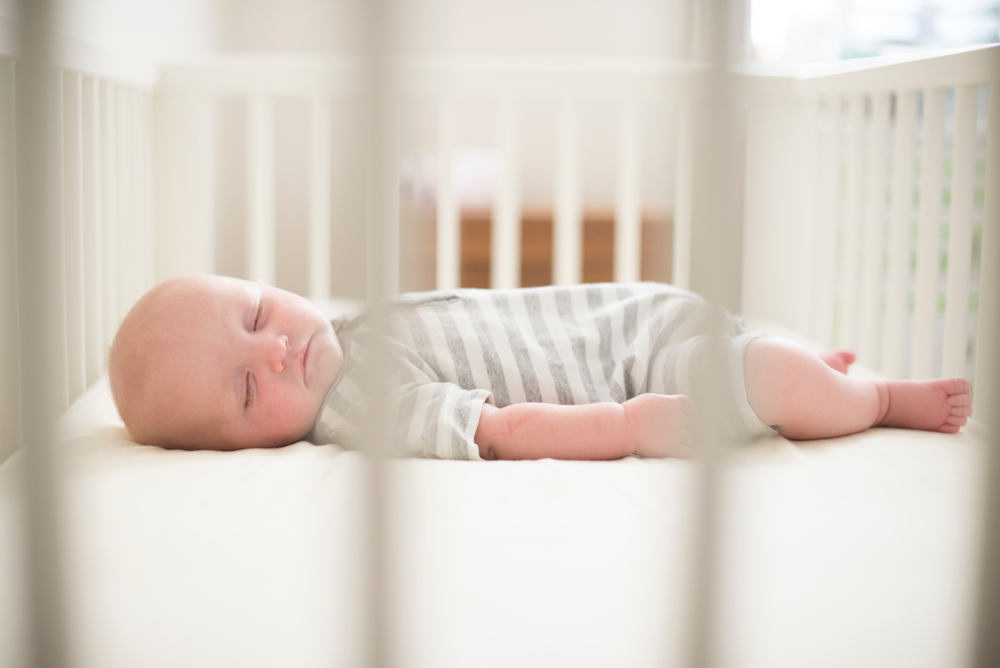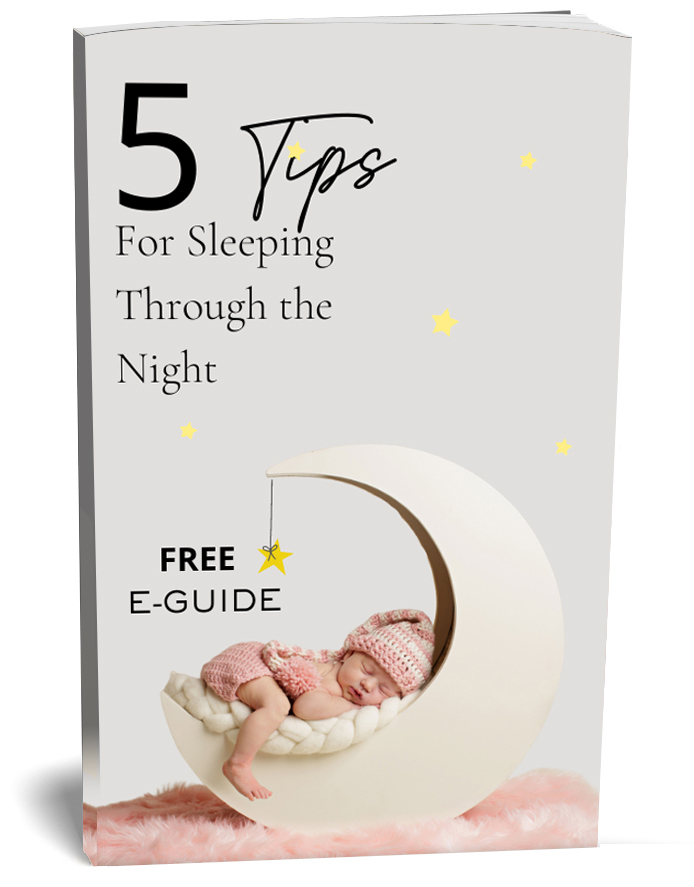
Sleep Training at 6 Months: Everything You Need to Know
Quiz time! Did you know all of the following?
- It’s possible to bore a baby to sleep. (Yes, really!)
- You may unknowingly be teaching your baby NOT to fall sleep.
- The cry-it-out method can interrupt your baby’s development in two key ways.
If you said “wow, really?” to any of these, join the club of parents who are taught all the wrong ways to soothe their six-month-old to sleep. (And that’s most of us!)
Don’t worry: I’ve worked with hundreds of desperate parents who told me, “If it hasn’t happened by now, I’m afraid my baby will never go to sleep on her own.” Totally untrue –– that is, if you have the right information.
Today I’ll show you what sleep training is, why it’s important, and how you can get started right now to better nights.
(Psst! Curious what other parents think of sleep training? Click here for testimonials.)
What Sleep Training Is…and Isn’t
Sleep training is a combination of methods, tailored to you and your baby, which help your baby learn to get to sleep easily, or fall back asleep easily at night.
Sleep training IS:
- Gentle and emotionally supportive
- Effective, even at later ages
- Natural to both you and your baby
Sleep training ISN’T:
- Frightening for your baby
- Night after night of “crying it out”
- Something you can “miss the window” on (yes, you can sleep train at 6 months!)
Need a consultation to get started on a better night’s sleep for your six-month-old? Contact me to today. I’m glad to help!
Why Should You Sleep Train Your 6-Month-Old?
Sleep is so important to both you and your baby. When you’re well-rested, you’re a better, happier and more engaging parent. When your baby sleeps, he’s experiencing a huge part of his lifetime’s growth and development.
In fact, a 2017 review published in the National Library of Medicine concluded that plentiful sleep is critical to your baby’s cognitive and physical growth.
Does this mean that if your baby is six months old and isn’t yet sleep trained, or struggles with naptimes, she’ll suffer later? Not at all! That’s the good news. As your baby begins to sleep better, she will have better days in which she’ll practice all those new skills she’s been working on.
There are other great reasons to help your baby sleep better. Sleep training teaches your baby to self-soothe, which gives her a sense of security. And it helps teach a routine, so other new life tasks, like school, may be easier for her to get used to later.
Will Sleep Training Be Harder at Six Months?
You’re probably wondering if sleep training is tougher when your baby has gone six months without a solid routine.
This depends on a few factors. Every baby is different, which is why you’ll need to be armed with as much information as you can get! And actually, sleep training at six months can be easier in some ways.
Here are the pros and cons:
The Pros:
- Your baby is developing an adult sleep-wake-sleep cycle at this time.
- Your baby is able to go longer between feedings.
- You know your baby’s personality, and what hasn’t worked so far.
The Cons:
- Poor sleep habits are becoming ingrained by six months.
- Your baby may be fearful of being left alone after all this time.
- Your baby has missed the usual time period when she would have learned to self-soothe.
Just a gentle heads-up: don’t wait. The issues above can worsen as your baby gets older. That means sleep training could take a little longer.
The sooner you pinpoint this problem and start gentle sleep training, the better. So let’s get down to what you really want to know: how to sleep-train your six-month-old baby.
3 BEST Tips to Sleep Train Your Baby at 6 Months
Tip #1: Teach Baby the Difference Between Night and Day
My friend’s mother had an oldschool saying about babies who wouldn’t sleep at night: “That baby has her watch on backward.”
It was cute until it was my own baby. I’ll bet you feel exactly the same way!
I often hear from parents who contact me: “My baby wants to sleep all day, then she’s up at night.” Or “She gets up just as randomly at nighttime as any other time.”
There are a few reasons for this. At first, your baby’s sleep was random because she was a newborn who couldn’t physically go long without a feeding. She also hadn’t experienced enough light v. dark to know the difference.
But after the first eight weeks or so, your baby should have gotten the picture that night is for sleep and day is for play. If she didn’t, by six months she has probably made it a habit to wake fully at all the wrong times.
What you need to do is make a clear distinction between night and day. Do all of these:
- During the day, keep the blinds open or use other ways of lighting your baby’s environment. The melatonin your child produces will eventually respond to light with wakefulness (and the opposite with sleepiness) if you’re consistent.
- Stimulate your baby during the day. Give her tummy time, let her crawl if she’s started with that skill, play hand games with her, take her to the park.
- Make nighttime dark. Dim the hallway and other lights and turn out your baby’s light if that doesn’t make her afraid. If you do need to get up with your baby during the night, keep a hall light or other distant light on. Try not to light your baby’s room if you can see well enough without it.
- Make nighttime boring. Speak in a sleepy, slow voice, even if your baby is crying hard. Move slowly and soothingly. Don’t rock your baby fast. Everything should be sllllooowwww, soothing…and yes…totally boring! Some babies wake at night just to play. Watching you go through the hoops of a whole song-and-dance to get her back to sleep are worth waking for. A boring, slow parent and no squeaky, fun toy or marathon rocking session aren’t.
Tip #2: Create a Bedtime Routine
This is absolutely critical to have at any age. But it’s most important while you’re trying to train your six-month-old baby. A great bedtime routine lets Baby’s brain and body know that it’s time to wind down.
A bedtime routine could actually be called a set of sleep associations –– actions or things that your baby relies on to sleep. But this sleep association is for everyone’s good. And it makes a habit that can last your child a lifetime so she grows well and does her best.
Here are my tips:
- K.I.S.S. (keep it simple, sweetheart): Include only three to five steps in your baby’s sleep routine. If you combine too many steps, or they’re too complex, they’ll exhaust you eventually. A simple routine should be one you can do almost anywhere, including at a hotel or friend’s house.
- The Three Bs: You may have heard of the “three Bs” sleep routine. They stand for bath, book and bed. If you don’t know where to start, start here. You can add on another step or two depending upon your baby’s personality and how she responds.
- Bath: I know I just mentioned a bath, but it is a stand-alone step because it works for so many babies. It even helps toddlers or preschoolers wind down. And I’ll bet you’ve relaxed after a tough day with a bath, too! Try a bath half an hour or so before pajama/sleep sack time.
- Singing: a nice lullaby before sleep isn’t a famous parent go-to for nothing! The rhythm and pitch of your voice can help relax your baby.
- Sleep duds: If your baby is past the sleep sack stage and is wearing a onesie or pajamas to bed, or wears just a cloth diaper and diaper cover, the changeover into “nighttime clothes” is a great signal that becomes a sleep-making habit.
- Gentle massage: Gently stroke your baby’s arms, legs and then the top of her head. Do this for a brief and consistent period of time each night. (Not every parent does this, but it’s great for babies who are naturally more anxious, more active, or just can’t settle.)
Tip #3: Put Your Baby Down When She’s Awake
There’s a caveat: your baby should be awake, but drowsy.
I know, I know: your baby’s head pops right up when you put her down awake. This is one that takes time, but once it takes, you’ll be glad you taught it.
Why put a baby down when she’s drowsy but awake? Because the most important thing you can do to improve your six-month-old baby’s sleep habits is to teach her to self-soothe.
Babies awaken during the night and fall asleep in a cycle. (You do, too, but you may not remember it.) When your baby half-wakes, he may fuss a little, but he doesn’t cry immediately. You may be going right into his room when he does this. Once he sees you, he is stimulated, and he wakes fully instead of drifting back off.
Another problem is that it is disorienting, and sometimes very frightening, for a baby to wake up in a different place than she fell asleep. Because of this, she’ll cry out, and you’re back to square one.
Now is the time to get your baby into the habit of self-soothing when you put her down. Worried she’ll struggle with this step? Let me help! Contact me for the tips and support you need.
If Her Sleep Issues are Sudden
If your baby was sleeping well but suddenly is waking during the night or fussing when she’s put down, consider these possibilities:
- It may be a sleep regression. (This article discusses sleep regression and why it happens.)
- It may be a growth spurt.
- It may be an illness. Make sure your baby is healthy.
- You may just need extra help.Take a look at my sleep packages and let’s get started on healthy and relaxing nights for you and your baby.
Six months is not too old to sleep train your baby! The sooner you get started, the sooner you’ll gently and effectively fix this issue. And the better your entire household will feel.





















